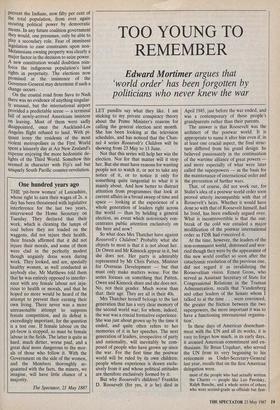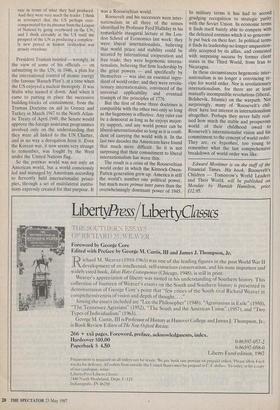TOO YOUNG TO REMEMBER
Edward Mortimer argues that
`world order' has been forgotten by politicians who never knew the war
LET pundits say what they like. I am sticking to my private conspiracy theory about the Prime Minister's reasons for calling the general election next month. She has been looking at the television schedules, and has noticed that the Chan- nel 4 series Roosevelt's Children will be showing from 23 May to 13 June.
Not that this series will help her win the election. Nor for that matter will it stop her. But she must have reasons for wanting people not to watch it, or not to take any notice of it, or to notice it only for something quite tangential to what it is mainly about. And how better to distract attention from programmes that look at current affairs in a broad sweep of time and space — looking at the experience of a whole generation of leaders right across the world — than by holding a general election, an event which notoriously con- centrates public attention exclusively on the here and now?
So what does Mrs Thatcher have against Roosevelt's Children? Probably what she objects to most is that it is not about her. Dr Owen and Mr Kinnock appear in it, but she does not. Her party is admirably represented by Mr Chris Patten, Minister for Overseas Development — but that must only make matters worse. For the series focuses on something that Patten, Owen and Kinnock share and she does not. No, not their gender. Much worse than that: their age. They are all in their 40s.
Mrs Thatcher herself belongs to the last generation that has a very clear memory of the second world war; for whom, indeed, the war was a crucial formative experience. She was just about grown up by the time it ended, and quite often refers to her memories of it in her speeches. The next generation of leaders, irrespective of party and nationality, will inevitably be com- posed of people who have grown up since the war. For the first time the postwar world will be ruled by its own children: people whose experience is drawn exclu- sively from it and whose political attitudes are therefore exclusively formed by it.
But why Roosevelt's children? Franklin D. Roosevelt (for yes, it is he) died in April 1945, just before the war ended, and was a contemporary of these people's grandparents rather than their parents.
The answer is that Roosevelt was the architect of the postwar world. It is appropriate to name it after him even if, in at least one crucial aspect, the final struc- ture differed from his grand design: he believed passionately in the continuation of the wartime alliance of great powers and more especially of what were later called the superpowers — as the basis for the maintenance of international order and the prevention of further wars.
That, of course, did not work out, for Stalin's idea of a postwar world order soon proved utterly incompatible with that of Roosevelt's heirs. Whether it would have done so with that of Roosevelt himself, had he lived, has been endlessly argued over. What is incontrovertible is that the out- break of the cold war entailed a major modification of the postwar international order as FDR had conceived it.
At the time, however, the leaders of the non-communist world, distressed and wor- ried though they were by the appearance of this new world conflict so soon after the cataclysmic resolution of the previous one, did not regard it as invalidating the Rooseveltian vision. Ernest Gross, who served as Assistant Secretary of State for Congressional Relations in the Truman Administration, recalls that 'Vandenberg and other leaders of the Senate whom I talked to at the time . . were convinced, the greater the friction between the two superpowers, the more important it was to have a functioning international organisa- tion'.
In these days of American disenchant- ment with the UN and all its works, it is easy to forget how much, in its early days, it aroused American commitment and en- thusiasm. Sir Brian Urquhart, who served the UN from its very beginning to his retirement as Under-Secretary-General last year, recalls that on the first American delegation were.
most of the people who had actually written the Charter — people like Leo Pavolsky, Ralph Bunche, and a whole series of others who were second-grade as officials but first- rate in terms of what they had produced. And they were very much the leader. I think in retrospect that the US perhaps over- compensated for its absence from the League of Nations by going overboard on the UN, and I think certainly in the US itself the prospect of the UN as producing a complete- ly new period in human civilisation was grossly overdone.
President Truman insisted — wrongly, in the view of some of his officials — on submitting to the UN, in 1946, a plan for the international control of atomic energy (the famous 'Baruch Plan'), at a time when the US enjoyed a nuclear monopoly. It was Stalin who turned it down. And when it came to putting in place the successive building-blocks of containment, from the Truman Doctrine on aid to Greece and Turkey in March 1947 to the North Atlan- tic Treaty of April 1949, the Senate would approve the foreign assistance programmes involved only on the understanding that they were all linked to the UN Charter, and in no way a derogation from it. Even the Korean war, it now seems very strange to remember, was fought by the West under the United Nations flag.
So the postwar world was not only an American world, but a world consciously led and managed by Americans according to fervently held internationalist princi- ples, through a set of multilateral institu- tions expressly created for that purpose. It was a Rooseveltian world.
Roosevelt and his successors were inter- nationalists in all three of the senses identified by Professor Fred Halliday in his remarkable inaugural lecture at the Lon- don School of Economics last week: they were liberal internationalists, believing that world peace and stability could be secured by international cooperation and free trade; they were hegemonic interna- tionalists, believing that firm leadership by the great powers — and specifically by themselves — was also an essential ingre- dient of world order; and they were revolu- tionary internationalists, convinced of the universal applicability and eventual triumph of the principles of 1776.
But the first of these three doctrines is compatible with the other two only so long as the hegemony is effective. Any ruler can be a democrat as long as he enjoys major- ity support, and any world power can be liberal-internationalist so long as it is confi- dent of carrying the world with it. In the last two decades the Americans have found that much more difficult. So it is not surprising that their commitment to liberal internationalism has worn thin.
The result is a crisis of the Rooseveltian world order in which the Kinnock-Owen- Patten generation grew up. America is still the world's number one political power, but much more primus inter pares than the overwhelmingly dominant power of 1945.
In military terms it has had to accord grudging recognition to strategic panty with the Soviet Union. In economic terms it finds itself barely able to compete with the defeated enemies which it so generous- ly put back on their feet. In political terms it finds its leadership no longer unquestion- ably accepted by its allies, and contested with surprising success by former client states in the Third World, from Iran to Nicaragua.
In these circumstances hegemonic inter- nationalism is no longer a convincing re- cipe for world order. Nor is revolutionary internationalism, for there are at least mutually incompatible revolutions (liberal, Bolshevik, Islamic) on the warpath. Not surprisingly, many of `Roosevelt's chil- dren' have lost interest in internationalism altogether. Perhaps they never fully real- ised how much the stable and prosperous world of their childhood owed to Roosevelt's internationalist vision and his commitment to the concept of world order. They are, ex hypothesi, too young to remember what the last comprehensive breakdown of world order was like.
Edward Mortimer is on the staff of the Financial Times. His book, Roosevelt's Children — Tomorrow's World Leaders and Their World, will be published on Monday by Hamish Hamilton, price £12.95.










































































 Previous page
Previous page